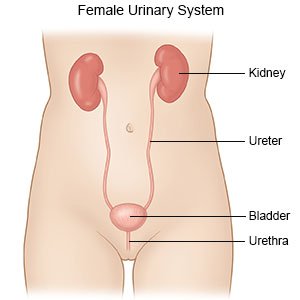Ureteroscopy
Medically reviewed by Drugs.com. Last updated on May 4, 2025.
A ureteroscopy is a procedure to examine in the inside of your urinary tract. The urinary tract your urethra, bladder, ureters, and kidneys. A ureteroscope is a small, thin tube with a light and camera on the end. Ureteroscopy can help identify problems in your urinary tract, such as kidney stones.
 |
DISCHARGE INSTRUCTIONS:
Call your doctor if:
- You have a fever.
- You cannot urinate.
- You have blood in your urine.
- You are vomiting.
- You have pain in your abdomen or side.
- You have questions or concerns about your condition or care.
Drugs used to treat this and similar conditions
Macrobid
Macrobid (nitrofurantoin) is an antibiotic used to treat urinary tract infections. Includes side ...
Ozempic
Learn about Ozempic (semaglutide) for type 2 diabetes treatment, weight management, cardiovascular ...
Methylprednisolone
Methylprednisolone is used to treat conditions such as allergies, arthritis, lupus and ulcerative ...
Ciprofloxacin
Ciprofloxacin is an antibiotic belong to a group of drugs called fluoroquinolones. Learn about side ...
Nitrofurantoin
Nitrofurantoin is an antibiotic used to treat urinary tract infections. Learn about side effects ...
Bcg
Bcg systemic is used for tuberculosis, prophylaxis, urinary tract tumors
Medicines:
You may need any of the following:
- NSAIDs , such as ibuprofen, help decrease swelling, pain, and fever. NSAIDs can cause stomach bleeding or kidney problems in certain people. If you take blood thinner medicine, always ask your healthcare provider if NSAIDs are safe for you. Always read the medicine label and follow directions.
- Antibiotics may be given to prevent an infection.
- Take your medicine as directed. Contact your healthcare provider if you think your medicine is not helping or if you have side effects. Tell your provider if you are allergic to any medicine. Keep a list of the medicines, vitamins, and herbs you take. Include the amounts, and when and why you take them. Bring the list or the pill bottles to follow-up visits. Carry your medicine list with you in case of an emergency.
Drink liquids as directed:
Liquids can help prevent kidney stones and urinary tract infections. Drink water and limit the amount of caffeine you drink. Caffeine may be found in coffee, tea, soda, sports drinks, and foods. Ask your healthcare provider how much liquid to drink each day and which liquids are best for you.
Follow up with your healthcare provider as directed:
Write down your questions so you remember to ask them during your visits.
© Copyright Merative 2025 Information is for End User's use only and may not be sold, redistributed or otherwise used for commercial purposes.
The above information is an educational aid only. It is not intended as medical advice for individual conditions or treatments. Talk to your doctor, nurse or pharmacist before following any medical regimen to see if it is safe and effective for you.
Further information
Always consult your healthcare provider to ensure the information displayed on this page applies to your personal circumstances.
